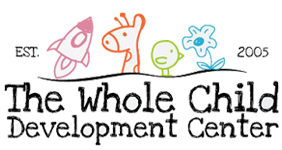![Divide and Conquer — Age-Appropriate Household Chores for Children Every year over 8.79 million children are enrolled in pre-primary school institutions, including daycares, with an average annual full-time care cost of USD 9,360 per child. With more mothers joining the workforce, need for affordable daycares has been increasing to teach children some basic life skills. However, teaching children household chores is essential as it helps them take […]](https://www.wholechilddevelopmentcenter.com/wp-content/uploads/2021/09/Picture5.png)
Every year over 8.79 million children are enrolled in pre-primary school institutions, including daycares, with an average annual full-time care cost of USD 9,360 per child.
With more mothers joining the workforce, need for affordable daycares has been increasing to teach children some basic life skills. However, teaching children household chores is essential as it helps them take responsibility and creates a habit of cleaning up after themselves.
Children can handle much more than what we might assume. Even toddlers can help with small chores, such as clean-up. The key is to start with smaller chores and gradually hop onto the more advanced ones as they get older.
Here is an age-appropriate guide to help you along the way.
TODDLERS (AGES 2-3)
Teaching children household chores at an early age is ideal it instills good habits from an early age. Moreover, toddlers find it exciting to help their parents and caretakers by replicating their actions and words.
Begin their training with tasks, such as:
- Putting their toys away
- Filling up food/water for the pets
- Placing dirty clothes in the hamper
PRESCHOOLERS (AGE 4-5)
Even though they are older than toddlers, preschoolers feel the same desire of helping parents and caretakers. By this age, children can do some chores that they started doing as toddlers without supervision. Parent can add in some new tasks that they seem naturally talented at.
With better hand-eye coordination, preschoolers can follow more complex instructions.
Some tasks can be as follows:
- Using hand-held vacuum to clean small areas
- Watering flowers/plants
- Putting away clean utensils
- Washing plastic dishes with supervision
- Sorting laundry color-wise
- Matching socks
- Dusting with a cloth
PRIMARY SCHOOLERS (AGE 6-9)
At this age, children can take on various responsibilities without a parent or guardian’s supervision. These tasks can be physically challenging or complex since they are continuing to learn the new skills.
With this age, children might learn to rebel as they learn more about independence and freedom. However, the key is to be patient and understand that they are still expected to help around the house.
Some tasks for primary schoolers can be:
- Sweeping the floor
- Helping make boxed lunch
- Cleaning their own bedroom
- Helping prepare dinner or making simpler breakfasts themselves
- Putting away their own laundry
- Take the pet for a walk (in the yard)
- Mopping the floor
- Empty indoor bins into the kitchen trash can
MIDDLE SCHOOLERS (AGES 10-13)
Preteens are old enough that they can do many tasks on their own without constant reminders.
At this age, it’s best to create a “To-Do List” or a chores chart. It teaches children self-reliance and being responsible when no one is watching.
Some of the tasks for middle schoolers can be:
- Washing dishes/loading and unloading dishwasher
- Washing the family car
- Preparing simple meals
- Using clothes washer and dryer
- Emptying all trash cans and kitchen bin outdoor trash can
- Babysitting younger siblings

The household training provided at home is essential for children as it teaches them the survival skills needed to look after themselves. However, during the younger ages, choosing the right daycare and the after-school program is equally important.
The Whole Child Development Center provides the best after school program and daycare services in Lenexa. From infants to kindergarteners, our team is well-trained to serve them all. Visit our website to know more or schedule a tour.







Leave a Reply
You must be logged in to post a comment.